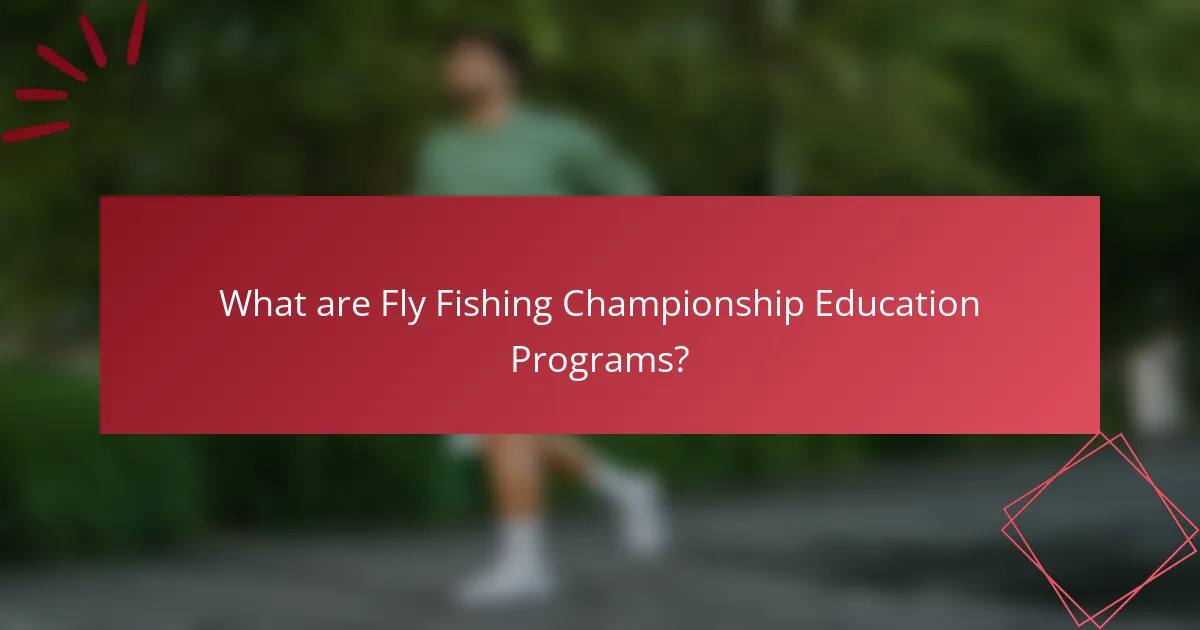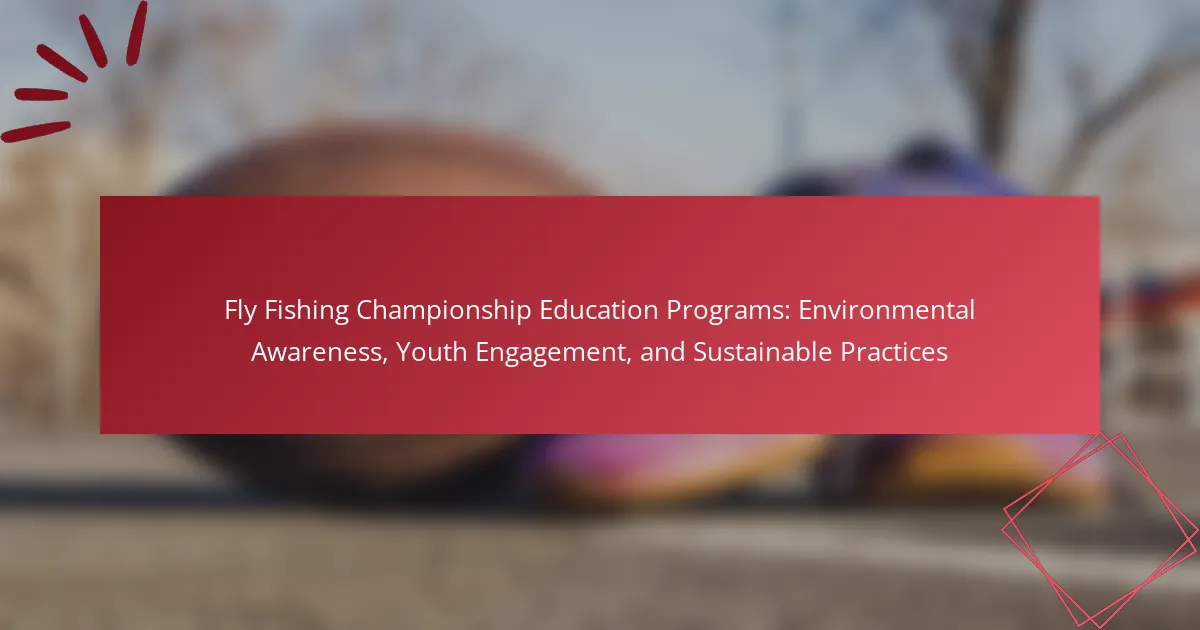Fly Fishing Championship Education Programs are structured initiatives designed to educate participants about the sport of fly fishing, emphasizing techniques, conservation practices, and environmental stewardship. These programs typically include workshops, hands-on training, and seminars led by experienced anglers and conservationists, focusing on the ecological impacts of fishing and the importance of sustainable practices. Additionally, they engage youth to foster interest in fly fishing and enhance environmental awareness. Evidence suggests that these educational efforts significantly improve knowledge and appreciation for aquatic ecosystems, promoting responsible fishing habits and conservation efforts.

What are Fly Fishing Championship Education Programs?
Fly Fishing Championship Education Programs are structured initiatives aimed at educating participants about the sport of fly fishing. These programs focus on teaching techniques, conservation practices, and environmental stewardship. They often include workshops, hands-on training, and seminars led by experienced anglers and conservationists. Participants learn about the ecological impacts of fishing and the importance of sustainable practices. These programs also engage youth, promoting interest in fly fishing and environmental awareness. Evidence shows that such educational efforts enhance knowledge and appreciation for aquatic ecosystems.
How do these programs promote environmental awareness?
These programs promote environmental awareness by educating participants about aquatic ecosystems. They highlight the importance of water conservation and biodiversity. Participants learn about the impact of pollution on waterways. The programs often include hands-on activities like river clean-ups. These activities foster a sense of responsibility towards the environment. Workshops and seminars feature experts discussing sustainable fishing practices. This knowledge empowers youth to advocate for environmental protection. Research indicates that educational initiatives increase environmental stewardship among participants.
What specific environmental issues are addressed in these programs?
The specific environmental issues addressed in these programs include water pollution, habitat degradation, and overfishing. Water pollution affects aquatic ecosystems and fish populations. Programs educate participants about the importance of clean waterways. Habitat degradation results from urban development and climate change. The initiatives promote conservation efforts to protect natural habitats. Overfishing threatens fish species and disrupts ecological balance. These programs encourage sustainable fishing practices to ensure long-term fish populations. By addressing these issues, the programs foster environmental stewardship among participants.
How do participants learn about the importance of ecosystem preservation?
Participants learn about the importance of ecosystem preservation through structured educational programs. These programs often include hands-on activities that demonstrate the impact of human actions on ecosystems. Workshops and seminars led by environmental experts provide scientific knowledge and real-world examples. Field trips to local habitats allow participants to observe ecosystems firsthand. Interactive discussions encourage participants to share their thoughts and experiences. Educational materials, such as brochures and videos, reinforce key concepts about conservation. Research indicates that experiential learning significantly enhances understanding and retention of environmental principles. Programs like these can lead to increased awareness and advocacy for ecosystem preservation.
What role do youth engagement initiatives play in these programs?
Youth engagement initiatives play a crucial role in fly fishing championship education programs. They actively involve young participants in learning about environmental stewardship. These initiatives foster a sense of responsibility towards natural resources. Engaging youth helps instill sustainable practices at an early age. Programs often include hands-on activities that enhance practical skills. Research shows that youth involvement increases awareness of ecological issues. For instance, studies indicate that engaged youth are more likely to adopt environmentally friendly habits. Thus, youth engagement initiatives are essential for promoting long-term sustainability in these programs.
How are young participants introduced to fly fishing?
Young participants are introduced to fly fishing through structured educational programs. These programs often include hands-on workshops that teach basic techniques and safety. Participants learn about the equipment used, such as rods and reels. They receive instruction on casting techniques and knot tying. Programs may also incorporate environmental education, highlighting the importance of aquatic ecosystems. Engaging with local fishing communities further enhances their experience. Many programs provide opportunities for guided fishing trips to practice skills. Research shows that early exposure fosters a lifelong interest in the sport.
What skills do youth gain from participating in these programs?
Youth gain various skills from participating in fly fishing championship education programs. These skills include teamwork, as participants often work in groups to learn and practice techniques. They also develop problem-solving abilities when faced with challenges during fishing activities. Communication skills improve as youth interact with peers and instructors. Participants gain environmental awareness through education about aquatic ecosystems and conservation practices. Additionally, they learn patience and focus, essential traits for successful fishing. Research indicates that hands-on experiences like these can enhance critical thinking skills. Overall, these programs equip youth with valuable life skills that extend beyond fishing.
Why are sustainable practices emphasized in fly fishing education?
Sustainable practices are emphasized in fly fishing education to protect aquatic ecosystems. These practices help maintain fish populations and preserve their habitats. Education programs teach anglers the importance of catch and release techniques. This method minimizes harm to fish and promotes population recovery. Furthermore, sustainable practices reduce pollution and habitat degradation. They encourage responsible gear usage and minimize environmental impact. Studies show that educated anglers are more likely to adopt sustainable behaviors. This leads to healthier waterways and improved biodiversity.
What are the key sustainable practices taught in these programs?
Key sustainable practices taught in these programs include catch-and-release techniques, habitat conservation, and water quality monitoring. Catch-and-release practices minimize the impact on fish populations. Habitat conservation focuses on protecting and restoring aquatic ecosystems. Water quality monitoring involves assessing and maintaining the health of water bodies. These practices are essential for ensuring sustainable fishing and preserving biodiversity. The programs emphasize the importance of responsible fishing to future generations.
How do these practices impact local fisheries and waterways?
These practices positively impact local fisheries and waterways. They promote sustainable fishing techniques. Sustainable practices reduce overfishing and preserve fish populations. Education programs raise awareness about the importance of aquatic ecosystems. Participants learn to minimize pollution and habitat destruction. Improved water quality benefits both fish and other wildlife. Engaging youth fosters a long-term commitment to conservation. Studies show that such programs enhance local biodiversity and ecosystem health.
How do Fly Fishing Championship Education Programs connect with local communities?
Fly Fishing Championship Education Programs connect with local communities by promoting environmental stewardship and engaging local youth. These programs offer workshops and hands-on activities that educate participants about local ecosystems. They emphasize the importance of conservation practices, which directly benefits the community’s natural resources. Additionally, these programs often involve local schools and organizations, fostering partnerships that strengthen community ties. According to a report from the American Fly Fishing Trade Association, such initiatives have successfully increased community participation in conservation efforts by over 30% in regions where they are implemented. This collaboration enhances awareness and appreciation of local waterways, creating a shared sense of responsibility among community members.
What partnerships are formed to enhance program effectiveness?
Partnerships formed to enhance program effectiveness include collaborations with local environmental organizations and educational institutions. These partnerships leverage resources and expertise to promote environmental awareness. Local fishing clubs often engage in outreach programs to teach sustainable practices. Schools may integrate fly fishing education into their curricula through these partnerships. Government agencies can provide funding and regulatory support for educational initiatives. Nonprofits may assist in organizing events that raise awareness about aquatic ecosystems. Such collaborations have proven effective in increasing youth engagement in conservation efforts.
What are the outcomes of participating in these education programs?
Participating in fly fishing championship education programs leads to increased environmental awareness among participants. These programs educate individuals about aquatic ecosystems and conservation efforts. Participants gain practical skills in sustainable fishing practices. They also develop a sense of responsibility towards nature. Youth engagement is significant, fostering interest in outdoor activities. Studies show that youth involved in such programs are more likely to advocate for environmental protection. Additionally, participants often form community connections through shared experiences. Overall, these outcomes contribute to a more informed and active citizenry in environmental stewardship.
How do participants apply what they learn in real-world scenarios?
Participants apply what they learn in real-world scenarios by implementing sustainable fishing practices. They utilize knowledge about local ecosystems to protect aquatic habitats. Participants engage in community clean-up efforts to enhance environmental awareness. They also share insights with peers to promote responsible fishing. Workshops teach them to identify invasive species and their impacts. This knowledge helps them make informed decisions while fishing. Real-life applications reinforce lessons learned in educational programs. Studies show that hands-on experiences solidify understanding of conservation efforts.
What long-term benefits can be expected from these educational initiatives?
Long-term benefits from educational initiatives in fly fishing include increased environmental awareness and improved sustainable practices. Participants develop a deeper understanding of aquatic ecosystems. This knowledge fosters a sense of responsibility towards conservation efforts. Engaging youth in these programs promotes lifelong interest in environmental stewardship. Studies show that early exposure to nature-related activities leads to increased pro-environmental behaviors in adulthood. Additionally, these initiatives can enhance community involvement and support local conservation efforts. Overall, educational programs contribute to the sustainability of natural resources for future generations.
What tips can help maximize the experience in Fly Fishing Championship Education Programs?
To maximize the experience in Fly Fishing Championship Education Programs, participants should focus on preparation, engagement, and practice. First, familiarize yourself with local fishing regulations and conservation practices. Understanding these rules enhances environmental awareness and promotes sustainable fishing. Second, actively engage with instructors and fellow participants. Networking can provide valuable insights and tips. Third, practice casting techniques before the program. Proficiency in casting improves overall performance during the championship. Lastly, keep a journal of your experiences and observations. Documenting your journey can deepen your understanding of fly fishing and its ecological impact.
Fly Fishing Championship Education Programs are structured initiatives designed to educate participants on fly fishing techniques, conservation practices, and environmental stewardship. These programs engage youth and promote sustainable practices through hands-on training, workshops, and community involvement. Key topics include the importance of ecosystem preservation, addressing environmental issues such as water pollution and habitat degradation, and fostering a sense of responsibility toward natural resources. Participants gain practical skills and knowledge that enhance their understanding of aquatic ecosystems and promote long-term sustainability within local communities.
